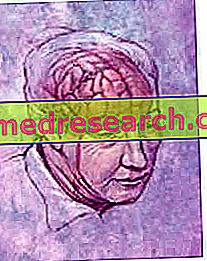Generality
Vascular dementia is a cognitive deficit caused by an altered blood circulation in the brain, which deprives blood of some areas of the organ, determining the progressive and irreversible death of brain cells.

The symptoms of vascular dementia can be very different from patient to patient, depending on the parts of the brain affected by the disease.
The diagnosis must be made very carefully, as establishing the extent of brain deterioration allows planning the best therapy; a therapy that, at present, is only able to improve the symptoms, but not to stop the inevitable deterioration.
What is vascular dementia?
Vascular dementia is a form of cognitive disorder, caused by an altered cerebral blood circulation and the consequent progressive death of brain cells.
DEFINITION OF DEMENTIA
There are various types of dementia, but they can all be considered, in general, a progressive and irreversible deterioration of cognitive functions, caused by the death of brain cells.
Following dementia, memory, language, judgment, thought, behavioral skills, etc. are distorted.
PREMONITORY SIGNALS: VASCULAR COGNITIVE DETERIORATION
Very often, vascular dementia is preceded by another disorder, the so-called vascular cognitive impairment, which can be considered a true warning signal or an early stage of the disease.
Epidemiology
Dementias are typical disorders of old age. In fact, according to one of the most reliable English scientific journals, they concern 5-7% of the world population over the age of 60 and, even, 30% of that over 80 years.
These percentages have grown over the last few decades and will tend to increase even more as we live longer and longer.
Vascular dementia is no exception and is fully in line with the above values. Moreover, it has a predilection for the Asian populations and the blacks of Caribbean origin, which, in both cases, are very likely to suffer from hypertension (high blood pressure). It is also more common among men than among women.
After Alzheimer's disease, vascular dementia is the most common form of dementia in the world.
Causes
Reduced blood circulation within the brain causes vascular dementia and brain cell death. In fact, by reducing the blood flow, the supply of oxygen and nutrients, which serve to keep the encephalon structures alive, fail.
But what are the precise pathological causes that give rise to vascular dementia? The following:
- Small blood vessel disease
- Stroke
- Mixed dementia
- Multi-infarct dementia
- Atherosclerosis
THE MAIN CAUSE: THE DISEASE OF SMALL BLOOD VASES
The most common cause of vascular dementia is, without doubt, the so-called small blood vessel disease .

The disease of small blood vessels is also known as subcortical vascular dementia .
OTHER CAUSES
Stroke, mixed dementia, multi-infarct dementia and atherosclerosis are considered minor causes of vascular dementia, as they are less frequent.
The stroke is caused by an interruption of the blood supply to the brain and may be due to numerous causes, including atherosclerosis (occlusion, due to fibro-adipose accumulations, of medium and large caliber arteries).
Mixed dementia is the result of the partnership between Alzheimer's disease and stroke, or between Alzheimer's disease and small blood vessel disease. Mixed dementia affects about 10% of people with dementia.
Finally, multi-infarct dementia is the result of several mini-strokes, which are characterized by affecting many small brain areas.
RISK FACTORS
Vascular dementia appears to be favored by risk factors of a different nature: some are related to genetics, others to a bad lifestyle.
- Genetic factors . There are more predisposed populations than others to suffer from hypertension; this is one of the main risk factors for stroke, and therefore also for vascular dementia. It should also be noted that, as regards the disease of small blood vessels, it appears to derive from a genetic mutation that alters the structure and size of the vessel wall. This last pathological condition is also known as CADASIL (acronym of Autosomal Dominant Cerebral Arteriopathy with Subcortical Infarcts and Leukoencephalopathy).
- Bad lifestyle . Having a wrong diet, being overweight, smoking and not keeping blood pressure under control: these are all factors that expose enormously to stroke, atherosclerosis and to many cardiovascular and neurodegenerative diseases.
Symptoms and Complications
To learn more: Symptoms Vascular dementia
Premise: the human brain is made up of many parts.

The symptoms of vascular dementia can be very varied and differ from patient to patient. In fact, they depend on which brain areas, once damaged, undergo death.
All possible disturbances are:
- Serious slowness of thought
- Severe sense of disorientation and confusion
- Memory loss (more or less continuous amnesia) and difficulty concentrating
- Difficulty finding words
- Serious and sudden personality changes (for example, the patient from calm becomes aggressive)
- Depression, mood swings and apathy
- Difficulty walking and balancing
- Need to urinate often, even if you don't suffer from any specific urinary tract disorders
- Suffering from hallucinations, or feeling or seeing things that do not exist.
PROGRESSION OF SYMPTOMS
Vascular dementia, once established, progresses inexorably and leads to death a brain area that gradually becomes more and more extensive.
However, this deterioration is not the same for all patients: for some, in fact, it is very rapid, while for others, it is very slow and suddenly accelerates following a certain event (which may be a heart attack, a transient ischemic attack, cardiopathies of various kinds etc).
HOW TO RECOGNIZE COGNITIVE VASCULAR DETERIORATION
As has been said, in many cases vascular dementia is anticipated by the so-called cognitive vascular deterioration, which is a milder and above all reversible mental disorder.
Its characteristic symptoms can be very different from one another and consist of: slow thinking, decision difficulties, loss of memory, stunted language, mood swings, personality changes and, finally, depression .
The latter, the depression, represents the most significant signal from the diagnostic point of view.
COMPLICATIONS
No particular complications are reported, except that the disease and symptoms tend to worsen gradually, without the possibility of recovery. In fact, once the brain cells die, the area of the affected brain is irreparably damaged.
Diagnosis
Diagnosing vascular dementia promptly helps to slow down progression; indeed, identifying its early form (ie cognitive vascular deterioration) could prevent its occurrence.
Therefore, at the first appearance of one of the aforementioned symptoms (loss of memory, difficulty in speaking, etc.) it is advisable to contact your doctor immediately, having a relative or close friend accompany you. The latter, in fact, will help the doctor in the diagnosis, remembering events or symptoms that the patient might inadvertently have forgotten.
EXAMS AND TESTS
The diagnostic path requires the following checks and instrumental tests to be carried out:
- Physical examination . The doctor observes the symptoms, if the patient reveals them during the examination, or asks to describe them to the relative or friend who accompany the patient. Timing is very important, ie knowing how long the disturbances have appeared.
- Full inquiry into the patient's medical history . The doctor can draw some relevant diagnostic conclusions if the patient suffers or has suffered in the past from some heart disease (for example, a heart attack) or a stroke. Also in this case, the patient could not remember his own clinical history, therefore he needs the contribution of the one who accompanied him.
- Verification of drugs taken by the patient . Some medications used for depression can give, among other side effects, hallucinations and other symptoms similar to those of vascular dementia. Therefore, knowing if and what medicines the patient takes can be essential to consider the hypothesis of vascular dementia or not. Once again, the companion's contribution is important.
- Examination of cognitive faculties . This exam is based on the so-called Montreal Cognitive Assessment (MoCA), a sort of evaluation test, ideal for mild cognitive impairment, which involves: attention and concentration, memory, language, abstraction, calculation and orientation. The duration of the MoCA is about 10 minutes.
- Blood analysis . They serve to exclude the possibility that the symptoms are due to vitamin deficiencies or other similar pathologies. For example, a diet deficient in vtiamine B3 can cause disorders similar to those of vascular dementia.
- CT and magnetic resonance (MRI) of the brain . By clearly showing the brain anatomy, these radiological examinations reveal the areas affected by the disorders and the triggering cause. In fact, vascular dementia could be mistaken for a brain tumor.
WHAT IS THE UTILITY OF ACCURATE DIAGNOSIS?
Beyond the timeliness, the accuracy of the diagnosis is also very important, as it allows the doctor to plan the most appropriate therapy. In fact, each patient is a case in itself and shows different disorders, depending on the area of the brain involved.
Treatment
Unlike vascular cognitive impairment, it is not possible to cure vascular dementia. However, progression can be slowed and symptoms can be limited.
To obtain these results, however, different therapeutic treatments must be used: from drugs for hypertension or for Alzheimer's to specific therapies for dementia.
Starting from how to avoid the negative evolution of vascular cognitive deterioration, all possible treatments for vascular dementia will be reported below.
TREATMENT FOR COGNITIVE VASCULAR DETERIORATION
The best thing to do, when you suffer from the so-called cognitive vascular deterioration, is to change your lifestyle and take a healthier one. In fact, very often, this disorder is caused by cigarette smoking, an unbalanced diet, overweight, high blood pressure and poor physical movement.
Correcting all these bad habits prevents, or at least reduces, the risk that the situation evolves towards the onset of vascular dementia.
TREATMENT OF VASCULAR DEEMENT
Premise: before describing every single therapeutic treatment, it must be specified that correcting a wrong lifestyle does not stop the progression of vascular dementia, but it remains an excellent advice
The treatment of vascular dementia is not at all simple and requires the support of various experts, such as neurological doctors, psychologists, physiotherapists and speech therapists.
Remembering that every patient is a case in itself, here are the pharmacological therapies, those specific for dementia and those rehabilitating.
Pharmacological therapy:
- Drugs against hypertension . Hypertension is one of the most recurrent risk factors among patients with vascular dementia. This explains why it is essential to plan a treatment based on drugs capable of lowering blood pressure, such as ACE inhibitors and beta-blockers.
- Acetylcholinesterase and memantine inhibitors . Acetylcholinesterase inhibitors, such as donepezil, galantimine and rivastigmine, are taken by those patients who show confusion and sleepiness. Memantine, on the other hand, is administered to slow down the cognitive deterioration typical of dementias. Together, these two categories of drugs represent one of the preferred drug treatments for Alzheimer's disease.
- Drugs against pathological conditions favoring . Treating pathological conditions, which favor or accompany vascular dementia, helps slow the progression of the latter. For example, they are given: statins if the patient suffers from high cholesterol; anticoagulants if the patient is at risk of stroke or venous thrombosis; antidepressants if the demented is depressed.
- Cerebrolysin . This preparation, still in the approval phase, is derived from the pig's brain cells and appears to have a positive impact on the cognitive functions (memory and thinking ability) of patients suffering from vascular dementia. For now, the results seem comforting, however it is appropriate to carry out further investigations.
To learn more: Drugs for the treatment of Vascular Dementia »
Specific therapies for dementia (or cognitive rehabilitation):
- Cognitive stimulation . Patients are required to carry out activities and exercises aimed at improving memory, language and the so-called problem-solving skills. Cognitive stimulation is carried out by different figures, experts in various fields.
- Reality orientation therapy (ROT) . The purpose of the ROT is to reinsert the subject into the surrounding environment and into the social context. To obtain this result, the patient is continually stimulated to remember places, particular dates, objects, and personal events.

- Validation method (VT) . The VT acts on the emotional sphere of the dementia patient, trying to focus the latter's attention on ties with the past or to make them regain a sense of dignity, lost due to illness. All this would seem to have a positive effect in reducing stress and anxiety, which often afflict the dementia, and in improving mood. The VT does not want to direct the patient to reality (as ROT does), but to ensure that he can live more peacefully with his problems.
- Behavioral therapy . As the name implies, it acts on the behavior of patients. In fact, the goal is to modify, and obviously improve, the problematic behaviors caused by the state of vascular dementia. It therefore acts on depression, on sudden personality changes, on aggression.
Rehabilitation therapies:
- Physiotherapy . Through it, we want to recover, at least in part, all those motor skills, which were lost as a result of vascular dementia. Furthermore, it aims to encourage movement.
- Language therapy . It aims to re-establish, as far as possible, the spoken language, in all those patients who, due to vascular dementia, are unable to express themselves in words.
Prognosis
The prognosis, for a patient with vascular dementia, can never be positive, as the various treatments that can be used do not cure the disease and do not even completely halt its progression.
However, the enormous benefits (from the improvement of symptoms to the slowing down of cognitive impairment) deriving from different therapeutic treatments must be emphasized: they allow the patient with vascular dementia to lead a decidedly better existence and to live longer than expected.




